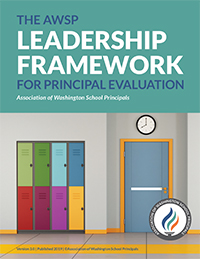Aug 12, 2019, 12:54 PM
by
Caroline Brumfield
This month, AWSP released an initial rollout of the AWSP Leadership Framework 3.0. AWSP is looking for districts from all nine ESDs who are willing to “test-drive” and review this draft by Feb. 1, 2020, to provide feedback that will inform the final version. The final version will be implemented statewide during the 2020-21 school year. If you are interested in becoming a Framework Feedback district, contact us by Nov. 1. Framework Feedback districts will receive a complimentary print copy of the Framework 3.0 draft for each administrator.

AWSP released an initial rollout of the
AWSP Leadership Framework 3.0. The final version will be implemented statewide during the 2020-21 school year. Several districts across the state will provide feedback throughout the year.
Background
The AWSP Framework 3.0 is the result of a process that included an analysis of other school leadership frameworks, feedback from focus groups and interviews with principals and their supervisors who have been using the original AWSP Framework. Like the frame of a house, this framework is designed to provide a foundation and structure for conversations leading to the development of building principals and assistant principals. Resources and commentary have been added to this version in order to support and emphasize the importance of growth-oriented conversations. Purposeful dialogue is what will bring this Framework to life.
ChangesWe’ve added consistency to the format across all eight criteria and levels of the rubrics. Additionally, the descriptions outside the rubric boxes have grown, while verbiage inside is more succinct. No leadership framework can encompass the complex role of the school principal—that was not our aim. Our goal was to create a document that provides a structure for conversations leading to the improvement of leadership practices.
RatingRating (assigning a numerical score) can be counterproductive and unreliable use of a framework that has been designed to improve leadership practices. The overuse of mathematical calculations to derive a final “evaluative score” causes time-consuming distractions and can inhibit the holistic analyses of performance and results. The language of each rubric should be used as guidance, keeping in mind that leadership is nuanced and complex and should be contextualized within the unique opportunities, challenges, and goals of the school community. Words such as minimal, measurable, and significant can only be understood and calibrated through growth-focused dialogue. Significant growth in one school may not be significant in another.
Thank YouWe thank the many educational leaders across our state who served as critical friends throughout the work. Their honest feedback and encouragement, based on a commitment to our profession, is a model for the conversations we hope this Framework facilitates between school leaders and those who support their growth.
Learn more about the AWSP Leadership Framework at
www.awsp.org/framework.